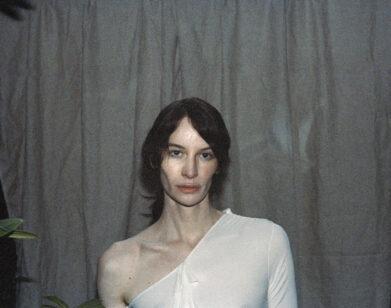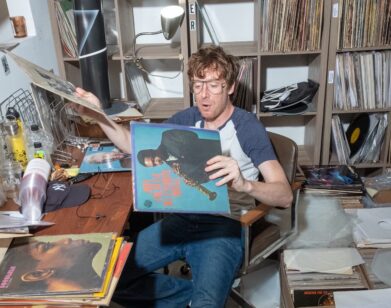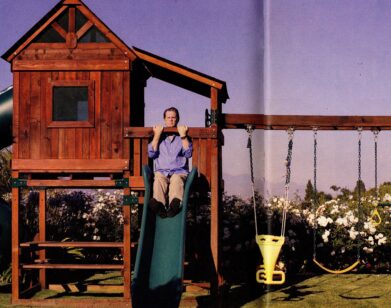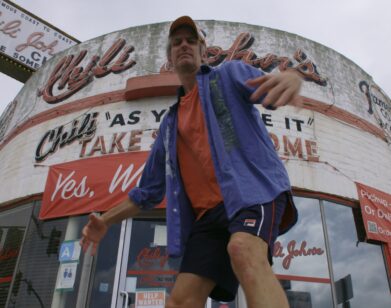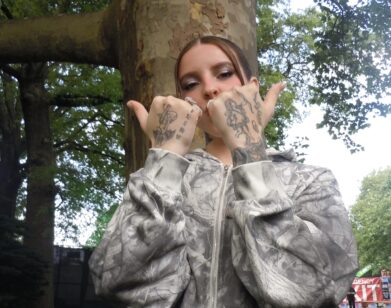Catching Up with (She &) Him

PHOTO BY SAM JONES
She & Him, the nominally inconspicuous marriage of whoever and whomever, dropped their sophomore release on March 23, 2010. It’s been warmly received by critics, and if a to-capacity outdoor performance on Governor’s Island last weekend is any indication, Zooey Deschanel (She) and M. Ward (Him) have found themselves a devoted fan base. Ward performed as he usually does–head down, back hunched over, facing his guitar almost as often as he faces his audience. He’s a spectacular live performer, but seems unfazed by the attention. On stage and in interviews, he seems content with the limelight on Deschanel.
Ward and Deschanel met when they collaborated on the soundtrack to her film The Go-Getter. When Deschanel told him she wrote songs, he asked her to send them to him. The rest, as they say, is history. Ward is an esteemed singer, songwriter, and guitarist with seven solo albums to his name. His 2006 album Post-War is widely considered just short of a modern indie masterpiece; “Chinese Translation” is as fine a piece of songwriting as you’ll hear. He’s also a star producer who’s worked with artists like Lucinda Williams, Cat Power, Jenny Lewis, and Norah Jones.
Naturally, a few eyebrows were raised when the collaboration with Deschanel was announced—actors’ forays into music rarely yield listenable results—but M. Ward had proven himself and both critics and audiences trusted him. News of the collaboration was met with more curiosity than skepticism: “The only thing I care about is the demo that I get in the mail–it doesn’t matter to me really what the writer has done in the past or what will work best commercially,” he explained in an e-mail. “I’m lucky to work with great singers who are able to deliver the lyrics in a believable way. If a song is going to work it’s going to come from the strength of the composition and the lead vocal, not the production.”
Ward is modest about his role in She & Him. (“Zooey is able to deliver her love songs with a brave naiveté that is all her own. I just try to make the productions support her voice,” he told me.) Though he may be humble and understated, his work is ubiquitous and immediately identifiable, like a John Fahey brand watermark. In past interviews, he’s identified himself as a guitarist first, and he’s established himself as one of the finest handlers of the instrument around. He describes the economy of his style with characteristic humility: “I’ve just never been much of a blabber-mouth and I normally hate hearing guitar solos in songs. In high school I learned a lot of George Harrison’s solos—they never go off on any needless tangents.”
But with Volume 2, Deschanel and Ward prove they have no reason for their modesty. In the video for “In the Sun,” Deschanel plays a woman who longs for the attention of a man who just isn’t interested. She sings and dances and widens her enormous blue eyes at and around Ward but he walks on, unmoved. “It’s hard to be alone/when I look at you, you look so bored/My baby, my darling, I’ve been taking a beating,” sings Deschanel. Meanwhile, the choreography is uncomplicated, unaggressive and bombastically joyful, the kind of impromptu dance arrangement you might expect to see in a G-rated musical. Though it may sound frothy and effervescent, but has at its center of gravity a Chekhovian kind of sadness that also pervades Ward’s solo work. Deschanel’s charm as an actress lies in the dissonance between the sweetness of her presence and the deadpan of her delivery. Her songwriting reflects that ratio between high and low emotional states. The songs about heartbreak, loss, betrayal, and yearning sound like something you’d hear at the beach.
“I don’t really know why certain lyrics work with certain chord changes, but I can say that I think it has something to do with balancing darks and lights, whether you’re talking about lighter happy lyrical ideas or darker minor chords or whatever—it needs to have balance the way a good photograph balances lights and darks,” Ward explained. “It’s hard to imagine lyrics like ‘It’s my party and I’ll cry if I want to’ working with slow minor chords.”

